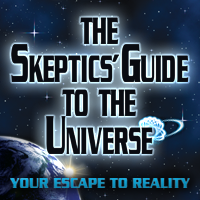SGU Episode 185
| This episode is in the middle of being transcribed by Gugarte (talk) as of {{{date}}}. To help avoid duplication, please do not transcribe this episode while this message is displayed. |
| SGU Episode 185 |
|---|
| 4th February 2009 |
 |
| (brief caption for the episode icon) |
| Skeptical Rogues |
| S: Steven Novella |
B: Bob Novella |
R: Rebecca Watson |
J: Jay Novella |
E: Evan Bernstein |
| Links |
| SGU Podcast archive |
| SGU Forum |
Introduction
You're listening to the Skeptics' Guide to the Universe, your escape to reality.
S: Hello and welcome to the Skeptics' Guide to the Universe. Today is Wed. Feb. 4th 2009 and this is your host Steven Novella, president of the New England Skeptical Society. Joining me this evening are Bob Novella …
B: Hey everybody.
S: Rebecca Watson …
R: Hello everyone.
S: Jay Novella …
J: Hey guys.
S: and Evan Bernstein.
This Day in Skepticism (0:30)
E: And a very happy Across the Universe day to everyone today.
S: Across the Universe day …
R: Is it National Beatles' Day?
E: Not quite, not quite …
J: It's a good guess.
E: so on this day last year, just last year, NASA transmitted Across the Universe, the Beatles song, as you alluded to, Rebecca, in the direction of the star Polaris, which is 431 light years from Earth.
R: Hah!
S: Cool!
R: I would have gone with the Rolling Stones.
E: It was done to celebrate the 40th anniversary of the song's recording and the 45th anniversary of the deep space network, and, of course, the 50th anniversary of NASA, which was last year. So it marks several occasions all in one. Across the universe.
J: That's a very cool way to celebrate it.
E: I think so and the people in Polaris will appreciate it 430 years from now.
News Items
Singularity University (1:16)
S: Ah, so Bob, you're going to tell us about some interesting news from Google and NASA called the Singularity University. Tell us about that.
B: Yeah, that got my attention, NASA and Google, Inc. teaming up with scientists, especially futurist Ray Kurzweil, to create something called the Singularity University. This official announcement was made recently at the annual TED or Technology, Entertainment, and Design conference in Long Beach, California. Now the term singularity in this context does not refer to a black hole but the increasingly popular idea that technological change feeds on itself, accelerating beyond what intuition might tell us. This could create game changing technologies in industries, not in many generations but maybe in less than one generation and, ah, it is this idea advocated by Ray Kurzweil in his book "The Singularity is Near: When Humans Transcend Biology." That book is what gave Dr. Peter Diamandis the idea for this university. He is the founder and chairman of the X-Prize Foundation and also co-founded the International Space University. So what is this university going to do and why do I want to go there so bad? If you go to their website: singularity-university.org, their mission statement says that the Singularity University aims to assemble, educate, and inspire a cadre of leaders who will strive to understand and facilitate the development of exponentially advancing technologies and apply focus and guide these tools to address humanity's grand challenges. Executive Director Salim Ismail describes it this way. He says what we are trying to do is create a group of young leaders that can understand the implications of the rapid acceleration that's happening in a lot of technologies today and manage that technology. It's not going to be cheap. It's $25,000 for one of their summer 9-week courses.
S: Why so expensive? I mean, did they justify that?
B: It's quite a unique experiment. I'm not sure why it's quite that much.
S: Is it the prestige or is it really some high tech stuff going?
B: Oh yeah, it is. Well, by definition, it's about as high tech as it gets. The first ... it's split into three 3-week sessions. The first one, the students will be diving into things like biotechnology, computing, artificial intelligence, energy, even law and finance. Then for the next 3 weeks, I think the students will pick one of those, ah, for a really deep exploration. One of those key fields it will take ... ah, so maybe if you already are an artificial intelligence guy, maybe you may want to look deep into, say, biotechnology or energy or something else. And then the last 3 weeks ... now that's the special part of it. This is ... this is where the students work on a special project. This is the part that was strongly advocated by Google co-founder Larry Page and in this ... for the special project, the students take a cross disciplinary approach and apply what they've learned to things like energy shortages, famine, global warming, climate change, poverty. One person describes this thing as imagine looking at hunger from an AI robotics stand point. So the idea is to foster this cross disciplinary approach and network with other people and other fields throughout the world and it's not just grads and post-grads that can go to this thing. They are also going to offer 10-day and 3-day seminars that's held throughout the year for top executives and things like that. I'm excited about this. I see these technologies coming down the pipe that people aren't even aware of.
S: Yeah, it's an interesting idea. The press release

|